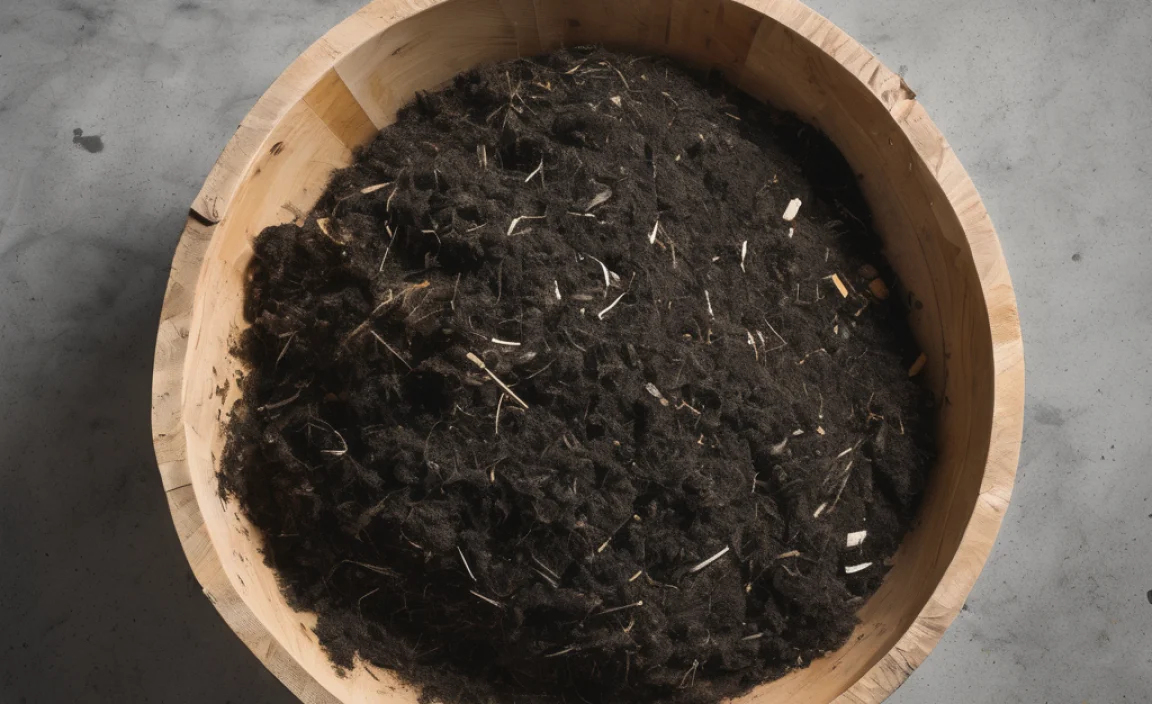Welcome to TopChooser! Finding the right air compressor for your farm shop can feel like a puzzle, right? You need something that’s powerful enough for tough jobs but also reliable and easy to use. Don’t worry, we’ve all been there. I’m here to break down exactly what you need to consider. We’ll walk through everything step-by-step, so you can pick the perfect compressor without the headache. Get ready to power up your projects!
Powering Your Farm Shop: Choosing the Best Air Compressor
Hey there, fellow DIYers and farm enthusiasts! Troy D Harn here, your go-to guy for making tough projects simpler. If you’re running a farm shop, you know how crucial a good air compressor is. It’s not just a tool; it’s the backbone for so many tasks, from fixing equipment to crafting something new. But with so many options out there, how do you pick the one that’s truly up to the job? It can seem a bit daunting, but don’t sweat it. I’m going to guide you through finding a compressor that’s efficient, reliable, and just right for your farm shop needs. We’ll look at what really matters, cut through the jargon, and get you set up with real-world advice. Let’s make sure your farm shop has the muscle it needs!
Why an Air Compressor is a Farm Shop Must-Have
Think about all the jobs you do on the farm. Air compressors are absolute workhorses. They power air tools like impact wrenches to quickly loosen stubborn bolts on tractors, nail guns for building repairs, and sanders for smoothing out metal or wood. Need to clean dust and debris off machinery? A blast of compressed air does that in a jiffy. Inflating tires on ATVs, trailers, or even the big farm equipment? Your compressor has you covered. It’s all about saving time, reducing manual effort, and getting professional results. A quality compressor isn’t a luxury; it’s an essential investment for efficiency and tackling projects head-on.
Understanding Air Compressor Basics: What You Need to Know
Before we dive into picking the “best,” let’s quickly cover some lingo. It’s not as complicated as it sounds, and knowing these basics will help you understand why certain compressors are better suited for farm shops.
- PSI (Pounds per Square Inch): This is the measurement of pressure. Many air tools require a specific PSI to operate effectively. Higher PSI means more power.
- CFM (Cubic Feet per Minute): This measures the volume of air a compressor can deliver. It’s super important because your tools need a certain CFM to run smoothly. More CFM is generally better for demanding tools.
- Tank Size (Gallons): This is how much compressed air the tank can store. A larger tank means you can run tools for longer periods without the compressor constantly cycling on and off.
- Horsepower (HP): This indicates the motor’s power. Generally, higher HP means more power to compress air, but CFM and PSI are often more critical for tool performance.
- Duty Cycle: This tells you how long a compressor can run before it needs to cool down. For farm shops, you want a compressor with a high duty cycle, ideally 75% or more, meaning it can run for 7.5 minutes out of every 10.
Knowing these numbers helps you match the compressor to the tools and tasks you’ll be using it for most often.
Key Factors for Selecting the Best Air Compressor for Your Farm Shop
Farm shops present unique challenges. You’re likely dealing with larger equipment, dirtier environments, and a need for robust performance. Here’s what to prioritize:
1. Power & Performance: CFM and PSI
This is arguably the most critical aspect. Your tools have specific air requirements. Check the manual for your most demanding tools – the ones that use the most air. You’ll need a compressor that can supply at least that much CFM at the required PSI. It’s always better to have a little extra CFM capacity than not enough. Running out of air mid-job is frustrating and inefficient. For farm shops, look for compressors with a minimum of 5-10 CFM at 90 PSI, but more is often better, especially if you’re running multiple tools or larger impact wrenches.
2. Tank Size: Continuous Work vs. Intermittent Use
The tank size dictates how long you can use your tools before the compressor motor has to kick in to re-pressurize. For most farm shop tasks that require sustained air (like using an impact wrench for an extended period or operating a sandblaster), a larger tank is beneficial. Think 60 gallons or more. For lighter, more intermittent tasks, a smaller tank might suffice, but for the versatility needed on a farm, bigger is often better. A larger tank also means the motor cycles less frequently, which can extend its lifespan.
3. Horsepower and Motor Type
While CFM and PSI are king, horsepower (HP) plays a role. A higher HP motor can produce more air, particularly at higher pressures. However, focus on the listed CFM at 90 PSI – this is a more direct indicator of the compressor’s real-world output. You’ll typically see two types of motors:
- Electric Motors: Common and convenient if you have reliable power access. Single-stage compressors are usually powered by smaller electric motors, while two-stage compressors often have more powerful electric motors.
- Gas Engines: Ideal for locations without easy access to electricity or for portability around a large property. They are typically more powerful but also louder and require fuel and maintenance.
4. Duty Cycle: Built for the Long Haul
Farm work is rarely a few minutes here and there. Your compressor needs to keep up. A compressor’s duty cycle is the percentage of time it can run within a 10-minute period. For a farm shop, you want a compressor with at least a 75% duty cycle. This means it can run for 7.5 minutes before needing a rest. Higher is better for continuous operation. Compressors with higher duty cycles are typically designed with better cooling systems and more robust internal components, making them more durable for demanding farm environments.
5. Portability vs. Stationary
Will you need to move your compressor around the shop or property? Or will it stay put in one place?
- Portable compressors (often smaller, wheeled units) are great if you only need air for specific tasks or if your shop space is limited. However, they usually offer less power and smaller tanks.
- Stationary compressors (larger, tank-mounted units) are the workhorses. They offer higher CFM, larger tanks, and are built for continuous use. These are usually bolted down or take up a dedicated space in a larger shop. For most farm shops, a stationary unit or a large, wheeled but powerful compressor is the way to go.
6. Oil-Lubricated vs. Oil-Free
This is an important maintenance consideration:
- Oil-Lubricated Compressors: These generally last longer, run cooler, and are quieter than their oil-free counterparts. They require regular oil checks and changes, but the durability is a big plus for farm shop use. The oil helps keep internal parts lubricated and cool, reducing wear and tear.
- Oil-Free Compressors: These are lighter, often more portable, and require less maintenance as you don’t need to worry about oil. However, they can be louder, run hotter, and may have a shorter lifespan under heavy use compared to oil-lubricated models.
For a farm shop where durability and long-term performance are key, an oil-lubricated compressor is often the preferred choice.
7. Power Source: Electric vs. Gas
Do you have ample electrical power to support a powerful compressor? What voltage is available? Farms can be tricky – you might have 120V power in some areas and 240V in others, or you might be relying on generators.
- Electric Compressors: Most common. Available in 120V (less power, limited tool compatibility) and 240V (more powerful, suitable for heavy-duty tools). If you have 240V, it opens up a lot more powerful options.
- Gas Compressors: Offer independence from the electrical grid, making them ideal for remote areas or large properties. They are typically more powerful but are noisy, require fuel, have exhaust fumes (meaning they need to be used in well-ventilated areas), and need more frequent maintenance.
When choosing, ensure your electrical setup can handle the compressor’s needs, especially if opting for a high-CFM electric model.
Top Air Compressor Features to Look For in a Farm Shop
Beyond the basic specs, a few extra features can make a big difference for farm shop life:
- Two-Stage Compression: Instead of pressurizing air in one go, two-stage compressors do it in two steps. This is more efficient, generates less heat, and allows the compressor to reach higher pressures more effectively. It’s ideal for tools that need consistent, high pressure for extended periods.
- Cast Iron Cylinder: This is a sign of durability. Cast iron cylinders are tougher and dissipate heat better than aluminum, leading to a longer lifespan for the pump.
- Quiet Operation: While farm shops aren’t usually silent zones, excessively loud compressors can be a nuisance and even harmful to hearing. Some manufacturers offer “quiet” models, often achieved through better motor design or sound dampening enclosures.
- Thermal Overload Protection: This built-in safety feature prevents the motor from overheating and burning out. It’s a standard on most reputable compressors but always worth confirming.
- Vibration Dampening: Compressors can shake things up! Features like rubber feet or a well-balanced design help reduce vibration, making the unit more stable and quieter.
Recommended Air Compressor Types for Farm Shops
Given the demands of a farm shop, certain types of compressors stand out from the crowd.
1. Two-Stage, Oil-Lubricated Stationary Compressors (Best Overall)
These are the workhorses of the industrial and heavy-duty DIY world, and by extension, the farm shop. They offer the best combination of power, efficiency, and durability.
- Pros: High CFM and PSI, long duty cycle (often 100%), quietest operation for their power, most durable, ideal for heavy-duty tools and continuous use.
- Cons: Most expensive, require a dedicated space, need proper electrical (usually 240V).
- Ideal for: Running multiple impact wrenches, sandblasters, paint sprayers for extended periods, powering large farm machinery maintenance.
If your budget allows and you have the space and power, this is the top-tier choice for a farm shop. Look for models from brands known for their robustness and reliability in industrial settings.
2. Large Portable/Vertical Tank Compressors (Good Versatility)
These are often 2-stage or high-output single-stage compressors with larger tanks (like 60-80 gallons) mounted on a vertical frame with wheels. They offer a good balance of power and a degree of mobility.
- Pros: Decent CFM and PSI, larger tanks than typical portables, can be moved if necessary (though still heavy), good for a variety of farm shop tasks.
- Cons: Still quite heavy and bulky, may not have the same longevity as a fully stationary unit, can be loud depending on the model.
- Ideal for: Shops where space is a bit tighter or where occasional relocation is needed, but still require good power for tools like grinders or moderate use of impact wrenches.
These can be a great compromise if you don’t have the dedicated space for a full stationary unit but need more power than a small portable.
3. High-CFM Gas-Powered Compressors (For Off-Grid or Large Properties)
If you’re far out or have many areas to cover without easy power access, a robust gas-powered unit is a lifesaver.
- Pros: True portability across large areas, no reliance on electricity, often very powerful.
- Cons: Noisy, produce exhaust fumes (requires good ventilation!), manual starting (sometimes), require fuel and more maintenance (oil changes, spark plugs, etc.), generally hotter operation.
- Ideal for: Field repairs on remote parts of the farm, operating tools where power cords can’t reach, emergencies.
Make sure to check the CFM output carefully, as some gas models are designed for lighter duty than their powerful engines might suggest. Always operate in a well-ventilated area due to exhaust fumes.
Essential Tools That Benefit from a Farm Shop Air Compressor
Having the right compressor unlocks the potential of many useful tools. Here are a few farm shop staples that run on compressed air:
- Impact Wrenches: Indispensable for quickly loosening and tightening stubborn nuts and bolts on tractors, implements, and vehicles. Different sizes exist for different jobs, from small 3/8″ drive for general tasks to hefty 1″ drive for heavy equipment.
- Air Ratchets: Similar to impact wrenches but deliver a continuous rotational force rather than hammer blows. Great for getting into tight spots where a standard ratchet or impact gun won’t fit.
- Die Grinders/Angle Grinders: Especially air-powered angle grinders are fantastic for cutting, grinding, and polishing metal. They offer good power and control.
- Sandblasters (Gravity-Fed or Suction): For removing rust, paint, and corrosion from metal surfaces. This is a huge time-saver compared to manual sanding.
- Nail Guns/Staplers: For building and repairing fences, sheds, feeders, or any wooden structures around the farm.
- Tire Inflators: Keep all your farm vehicle and equipment tires properly inflated for safety and efficiency.
- Blow Guns: Essential for cleaning dust, sawdust, and debris from tools, machinery, and work surfaces.
Maintaining Your Air Compressor for Longevity
To get the most out of your investment and ensure it’s always ready when you need it, regular maintenance is key. Here’s a simple checklist:
- Drain the Tank: This is the MOST important step. Condensation builds up in the tank and can cause rust and damage. Drain it at the end of each day or every use. Most compressors have a drain valve at the bottom of the tank.
- Check Oil Levels (for oil-lubricated models): Do this before each use. Low oil can severely damage the pump. Use the type of oil recommended by the manufacturer – often a special synthetic compressor oil.
- Clean the Air Filter: A dirty filter restricts airflow, reduces efficiency, and puts a strain on the motor. Check and clean or replace it regularly, especially in dusty farm environments.
- Inspect V-Belts (if applicable): For belt-driven compressors, check the tension and for any signs of wear or cracking. Replace as needed.
- Listen for Unusual Noises: Your ears are a great diagnostic tool. Any new rattling, grinding, or hissing could indicate a problem that needs attention.
- Keep it Clean: Wipe down the compressor regularly to prevent excessive dust and dirt buildup, which can clog cooling fins and vents.
- Professional Service: Consider having it serviced professionally every few years, especially if you’re using it heavily. They can check valves, seals, and other components that might be overlooked.
Following these simple steps will help ensure your air compressor works reliably for years to come. For more detailed guidance, always refer to your compressor’s owner’s manual. You can often find helpful resources and troubleshooting guides on manufacturer websites or through industry associations.
Comparing Popular Air Compressor Brands and Models
While I can’t recommend a single “best” model without knowing your exact needs, here are some reputable brands known for producing quality compressors suitable for farm shop use. When choosing, focus on the CFM, PSI, tank size, and duty cycle appropriate for your tasks. Always check recent reviews for specific models.
Top Brands for Farm Shop Use:
- Ingersoll Rand: A professional-grade brand known for extreme durability and reliability. Their two-stage compressors are top-notch for heavy-duty applications.
- Quincy Compressor: Another industrial-grade leader, Quincy compressors are built to last and perform under pressure. They offer excellent efficiency. Check out their QR-21 series for robust farm shop options.
- DeWalt: Offers a range of compressors, including some powerful portable and stationary units that can handle farm shop tasks. Look for their higher CFM models if budget is a consideration.
- Campbell Hausfeld: A widely available brand with many options. Some of their larger industrial or two-stage models can be suitable for farm shops.
- Husky: Often found at big box stores, Husky offers a range of compressors. Their larger vertical tank models can be a good value for moderate farm shop needs.
When you’re looking at specific models, keep an eye on the specifications:





